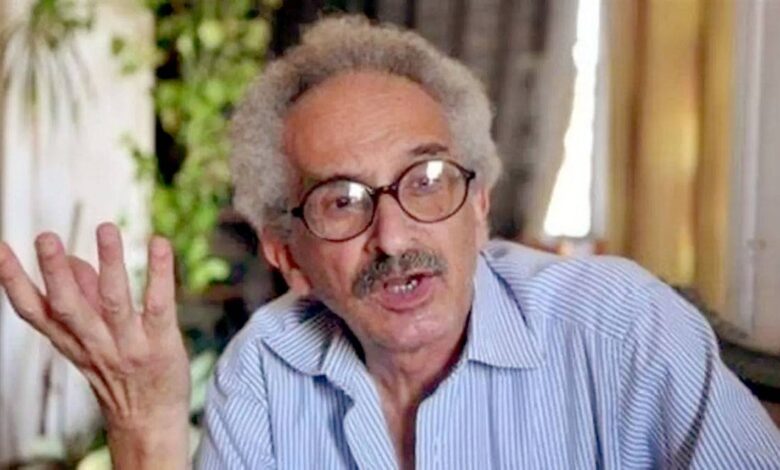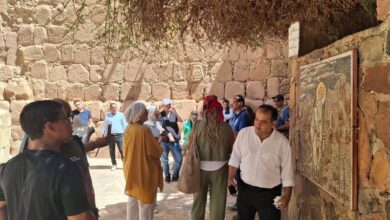God made Ibrahim … the departure of one of the most prominent pillars of the Arabic novel

Cairo: Ahmed Ibrahim
In a sad morning, God made, making Abraham, one of the pillars of the Arabic novel and the writer who was not just a novelist, as much as it was a living conscience written from the heart of the homeland, and wondered history without fear or courtesy, where during his life he issued a large and distinctive collection of literary works, varied between the novel, the short story and children’s stories, and some of them entered into the list of the best Arab novels, to leave our world on Wednesday morning, at the age of 88 He had pneumonia, leaving behind a rich literary legacy that spanned decades, to fold his departure from one of the most important pages of Arabic literature, which was written with truth and pain, and with many endless questions.
The great novelist had been subjected to a fall at his home, which resulted in a fracture in the neck of the right thigh bone, so he was transferred to the Nasser Institute Hospital in Cairo, where a team of consultants dealt with his condition, and he was performed successful surgery, and he was discharged from the operating room in a stable health condition, and then his condition deteriorated again after he was subjected to acute pneumonia, to be transferred to the hospital for treatment through an industrial breathing device However, he did not last long, and he left safely.
*consciousness
The manufacture of God was born in Cairo in the year 1937, and he grew up in a turbulent cultural and political environment, which constituted his early awareness about the issues of the homeland and the concepts of freedom and justice, and his father had a great impact on the formation of his personality, as he was keen to provide him with books and stories and urged him to inform, so his literary personality began to form from the young, so that God has made the rights, He departed from it heading to the press and politics, so literature was not intellectual for him, but rather a means of resistance, a tool of expression, and a platform for those who have no voice, so he chose from his beginnings to be on the side of the marginalized, and to write about them, not about the elite or power.
In the fifties of the last century, the work of God joined the Egyptian Communist Organization, “Hadto”, and was arrested because of it in the year 1959, as part of a broad campaign that affected the Egyptian leftists, and spent five years in the prison prison, but that harsh experience did not defeat him or break his soul, but rather he got out of prison in the year 1964, loaded with an unforgettable memory, and began writing his first novel “that smell” that was published in the year 1966, It was a declaration of a rebellion on the traditional narrative form, and it was not just a novel, but rather as some described it as a “literary shock”, in its dry style, its brief language, and the absence of traditional plot, during which it was intended to express the alienation of a whole generation, and the disappointment of the intellectual, so that God will start making in the incision of his own path, which does not resemble anyone, and does not imitate anyone.
The late writer began his journalistic work in the Egyptian News Agency in 1967, then worked for the German News Agency in East Berlin in 1968, until 1971, after which he went to Moscow to study cinematic filming and work to make film, then returned to Cairo in 1974, to devote himself to free writing starting in 1975.
effect
God’s manufacture is gone, but undoubtedly will remain its effect remaining, and his name will remain present in every discussion of committed literature, and in every attempt to understand the relationship between the writer and society, and in every novel written with honesty and boldness, indicating that writing is not just an artistic act, but rather a moral position, to remain a rare model for the writer who did not compromise, and did not retreat, and only what he believes in, so he won many Arab prizes Sultan Al -Owais Cultural, and sparked controversy in the literary center when he apologized for not receiving the “Cairo Forum for Arab Finance Creativity” because of his position on the government at the time, and he received the “Ibn Rushd Award for Free Thought” in 2004, and the “Bavis Literature” award in 2017, and an honor award he received when he reached the year of the eighteenth His literary and intellectual heritage will remain a beacon for everyone who believes that the word can change the world.
*Positions
Abraham’s manufacture was not written from a “ivory tower”, but was keen to write from the heart of the street and the pulse of people, so his literary production was distinguished by historical documentation, focusing on the political situation in Egypt and the Arab world, as well as his narration of many of his personal life, which was explained through his literary works such as: the committee, Beirut Beirut, American, the turban and the hat, the same, the ice, the star, the star, the star, the star, the star, the star, the star, the same All of them were attempts to understand the Egyptian political and social reality, as he presented the novel “Sharaf”, which ranked third among the best hundred Arabic novels, and other literary works that enjoyed a distinguished position in the world of Arabic literature, and away from the world of the novel, the late translated some works from international literature such as: “Feminine experience: a selection of international women’s literature” and “enemy” by the American writer and the playwright, James Drot. And “ass” by Jonter de Bruyne, one of the most prominent German novelists in the twentieth century.
God’s manufacture was distinguished by his experimental style, which broke the traditional templates of the novel, where he used documents, press reports, and sometimes dry language, to create a different narration that resembles reality in his absurdity and contradictions, he did not seek to enjoy the reader as much as he was seeking to wake him up, disturb him, and push him to think, and in this context, his narration is the most prominent The hero is a mysterious committee to be achieved with him without a clear reason, in a futile narration that mimics the repressive “bureaucracy”, as he tried through other works, as in the novel “Americani”, to present a sharp criticism of international domination politically and culturally.




